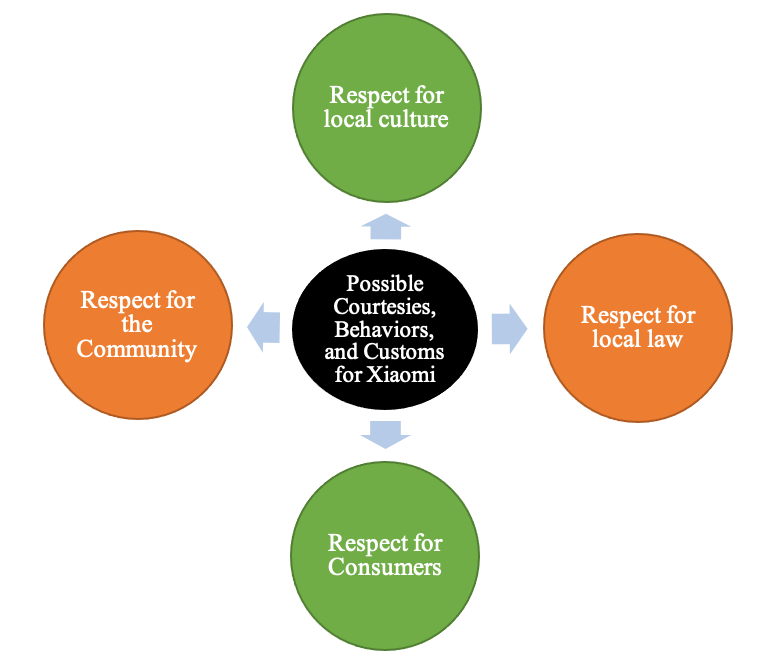In all countries, ethics and social responsibilities govern how an organization operates. These ethics and social responsibilities may be governmental, subcultural, or cultural. In China, governmental aspects include complying with all applicable laws and regulations, respecting the Chinese culture and traditions, and ensuring that all employees are treated fairly and equitably, regardless of nationality or ethnicity. Cultural ethics and social responsibilities promote cultural understanding and appreciation among employees and customers, support local charities and organizations that promote Chinese culture and heritage and respect the diversity of beliefs, values, and opinions within the Chinese community. Subcultural dimensions promote positive relationships between different subcultures in China, such as those between Han Chinese and minority ethnic groups. These support initiatives promote education, economic development, health care, and other social services for minority communities in China and respect the language, customs, beliefs, values, and traditions of minority communities in China while also recognizing their right to self-determination within the larger Chinese society. The different ethics and social responsibilities impact an organization like Xiaomi Company and need to be closely observed.
Challenges that the Organization Faces
Respect for Chinese Culture and Traditions
Xiaomi Company must respect the country’s culture, traditions, language, customs, and values. According to AadmiConsulting (2021), organizations must be aware of the cultural sensitivities of their employees and customers and ensure that their products and services align with Chinese cultural norms, which might be challenging to the Organization.
Compliance with Chinese Laws
The Organization must comply with all applicable laws and regulations (AadmiConsulting, 2021), including labor rights, environmental protection, intellectual property rights, anti-corruption measures, data privacy, and consumer protection, which may pose some challenges to organizations.
Corporate Social Responsibility
Xiaomi Company should strive to be socially responsible by engaging in activities that benefit the local community or environment. This could include providing residents with job training or educational opportunities or investing in renewable energy sources.
Transparency
The Company should strive to be transparent about its operations and activities by providing accurate information to customers, employees, suppliers, investors, regulators, and the public. This includes disclosing their financial performance and any potential risks associated with their operations. Transparency is a key challenge to the Organization as it becomes hard to disclose all its information to all its stakeholders.
Possible Courtesies, Behaviors, and Customs for the Organization
Respect for Local Culture (Kaplan, 2022): Xiaomi should respect the local culture of China and strive to understand the country’s cultural nuances. This includes understanding the language, customs, and values of Chinese people. Xiaomi should also be aware of potential cultural misunderstandings arising from their activities in China.
Respect for Local Laws: Xiaomi should ensure that all its activities in China comply with local laws and regulations. This includes understanding the legal framework governing business operations in China and any specific laws or regulations related to their particular industry or product.
Respect for Local Consumers and communities (Kaplan, 2022): Xiaomi should strive to understand the needs and preferences of Chinese consumers and the whole community and design products and services that meet those needs. This includes understanding local tastes, preferences, and trends to create products tailored to Chinese consumers’ needs. They can also engage in sponsoring local events or initiatives that benefit the community at large. The following chart shows the behavioral responses diagrammatically.

Recommendations
Xiaomi should be transparent about its operations in China by providing accurate information about its activities and products to customers and other stakeholders on time. It should respect the culture, employees, law, communities, and consumers. It should focus on doing what is right based on Chinese culture and the law.
Conclusions
Governmental, subcultural, cultural ethics and social responsibilities impact an organization’s operations. Some of these responsibilities challenge organizations as they pursue to meet their objectives. These responsibilities impact the operation of Xiaomi, and it must exhibit some courtesies, behaviors, and customs to manage its marketing.
References
AadmiConsulting. (2021, October 6). Challenges of Doing Business in China & How to Overcome Them. Aadmi | Global Expansion, Compliance, and Retraction. https://aadmi.com/5-challenges-of-doing-business-in-china-and-how-to-overcome-those-challenges/
Kaplan, S. D. (2022). How to Navigate the Ethical Risks of Doing Business in China. Harvard Business Review. https://hbr.org/2022/01/how-to-navigate-the-ethical-risks-of-doing-business-in-china
 write
write